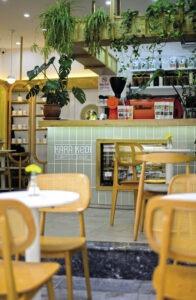Sustainable gastronomy
Whenever the term “sustainability in hospitality” is mentioned, we can see nodding and smiling faces: of course it is important! At the same time livelihood issues inevitably take precedence over the protection of our environment, our resources and our planet.
This article is available for reading in Trade magazin 2025/8-9.
Sustainability decisions are about two things: the restaurant owner’s attitude towards the issue and the compelling force of consumer expectations. To a certain extent the profession is forced to operate in an environmentally conscious manner, as the general environmental regulations applicable to it include mandatory selective waste collection, proper food waste management and a ban on single-use plastics.

Sustainability is not merely about a restaurant’s environment, but also its survival
Answers
The “farm-to-table” approach isn’t only trendy but also practical. Short supply chains mean fresh ingredients, a smaller ecological footprint and more stable prices. Involving local producers strengthens community ties and provides an appealing story for the restaurant’s communications: guests appreciate knowing where their food comes from. With the rise of takeaway and home delivery, the environmental impact of packaging has become a key issue. The use of recyclable, compostable boxes or minimal packaging protects the environment and also reduces waste disposal costs in the long run. Conscious menu planning, portion optimisation and the creative use of leftovers can drastically reduce food waste.
For yourself and for others
Sustainability measures are the most effective when guests are aware of them. Pictograms on the menu, short stories about producers or displaying green certifications strengthen trust and set the restaurant apart from its competitors. Transparency is an increasingly important factor in consumer decisions. Training employees to work consciously (sorting waste, energy-efficient work processes) benefits the environment and increases team commitment. Sustainability is already data-driven: inventory tracking systems show exactly where waste occurs and energy monitoring software can optimise consumption.
From the service provider’s perspective
Sustainability in the hospitality industry isn’t just about eliminating plastic drinking straws or using organic cleaning products, says Ákos Bősze, HoReCa business development executive of METRO.

Ákos Bősze
HoReCa
business development
executive
METRO
“The problem is much deeper than that: how can the business model itself survive in such a fragile sector, where everyday challenges constantly put businesses to the test?”
he asks.
This means that sustainability in hospitality isn’t only an environmental issue, but also a business one. Designed specifically for the HoReCa segment, the DISH by METRO digital platform plays a vital role in increasing revenue. It makes it easy to create a professional website with a table reservation module, which can also be supplemented with a home delivery option. In the area of raw material procurement METRO offers multi-channel solutions, so frozen, chilled and dry goods can all be delivered in a single shipment. The METRO CHEF brand guarantees the expected quality at a favourable price. METRO Professional appliances provide a solution to rising energy costs: modern, ready-to-use, heavy-duty yet energy-efficient equipment help with everyday operations. At the METRO Gastro Academy more than twenty chefs train kitchen and dining area professionals.
Related news
Metro recalls peanuts
🎧 Hallgasd a cikket: Lejátszás Szünet Folytatás Leállítás Nyelv: Auto…
Read more >Close to consumers
🎧 Hallgasd a cikket: Lejátszás Szünet Folytatás Leállítás Nyelv: Auto…
Read more >Related news
Historic price reduction at ALDI
🎧 Hallgasd a cikket: Lejátszás Szünet Folytatás Leállítás Nyelv: Auto…
Read more >A stable compass in the Hungarian FMCG sector for 20 years
🎧 Hallgasd a cikket: Lejátszás Szünet Folytatás Leállítás Nyelv: Auto…
Read more >







